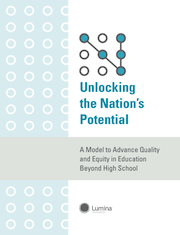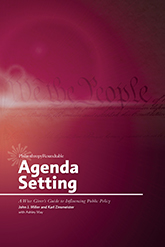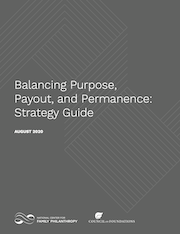Site Search
- resource provided by the Forum Network Knowledgebase.
Search Tip: Search with " " to find exact matches.
To answer the basic question of how many active family foundations are planning to spend down or exist in perpetuity (or have not yet made a decision), and to examine foundations’ motivations and decision-making, the Foundation Center, in collaboration with the Council on Foundations and with additional assistance from the Association of Small Foundations, launched a study of family foundations in 2008. This report presents the full range of study findings, which are based on survey responses from 1,074 family foundations.
Summer always brings to mind those great “summer reads.” This has been an “occasional series” of CNJG eNews during the summer, over the years. In addition to this year’s curated list – I’m thrilled to share recommendations from a few CNJG Board members and the CNJG team!
CNJG Board of Trustees’ Secretary, Maisha Simmons, Robert Wood Johnson Foundation, recommends Heather McGhee’s The Sum of Us: What Racism Costs Everyone and How we can Prosper Together. There’s also a podcast series, and the book has been adapted for young readers.
The Work: My Search for a Life that Matters by Wes Moore is the top pick from Board member, Jasmyne Beckford, The Prudential Foundation. Jasmyne reflects, this book helped her think about how she can live a life that creates impact for generations both personally and professionally.
CNJG Board member Justin Kiczek, F. M. Kirby Foundation, recently read Getting Beyond Better: How Social Entrepreneurship Works. “As our foundation holds both stewardship and entrepreneurship as core values, it helps me understand how social entrepreneurs start their journey and scale their solutions.”
In honor of Black Philanthropy Month this August, I’m excited to feature a few great reads created to inspire and inform your philanthropic journey. Thank you to Manager of Communications Shakirat Odunsi for curating this list:
- Madam C. J. Walker's Gospel of Giving: Black Women's Philanthropy during Jim Crow highlights Walker’s visionary approach to philanthropy and community-building, emphasizing the vital role of Black women’s giving in advancing social justice. Freeman’s work sheds light on how Walker’s philanthropy was an extension of her entrepreneurial spirit and commitment to racial and gender equality.
- Ford Foundation’s Darren Walker reimagines Andrew Carnegie’s vision of philanthropy for the modern era in From Generosity to Justice: A New Gospel of Wealth, urging philanthropists to go beyond charity and address systemic inequalities to foster justice and lasting change.
- Emergent Strategy: Shaping Change, Changing Worlds encourages readers to embrace adaptability and resilience by using emergent strategies – small-scale actions that create large-scale impact. Author adrienne maree brown challenges traditional models of organizing and invites us to envision a more just and equitable world through collaboration, creativity, and deep connections with others. It’s a guidebook for those seeking to shape the future and navigate the complexities of change.
- Isabel Wilkerson explores how entrenched hierarchies based on race and class impact every aspect of our lives in Caste: The Origins of Our Discontents. Through compelling narratives and meticulous research, she reveals how this hidden system continues to perpetuate inequality and injustice, challenging us to confront these deeply rooted structures and work toward true equality.
From the CNJG team, Director of Member Services Craig Weinrich is currently reading How We Give Now: A Philanthropic Guide for the Rest of Us by Lucy Bernholz. This book demonstrates that philanthropy is about much more than money. Bernholz posits that even giving our data willingly to companies is an act of philanthropy. This is a great intersection to the Spring Colloquium conversation around AI, and ongoing discussions about how we can expand our definition of philanthropy as guided by our Strategic Plan.
Chanika Svetvilas, Manager of Programs and Learning recommends Against Technoableism by Ashley Shew and Imagination A Manifesto by Ruha Benjamin. Not too long ago I read Four Thousand Weeks: Time Management for Mortals, which prompted me to really consider what each of us should focus on in our day-to-day work, and what we need to let go. It’s a practical, insightful guide that led to several “aha” moments. All three books challenge us to think very differently about our world and what’s possible.
And finally, a recently discovered read I’ve gifted to family and friends, All the Colors of Life by renowned artist Lisa Aisato; this will lift your spirits as you find yourself paging through it and experiencing it over and over again.

Happy Summer Reading!
On a different note, I hope you will join us at the Summer Joint Policy Forum – Nonprofit and Philanthropic Champions for New Jersey on August 13, at The Heldrich in New Brunswick. I look forward to seeing you there, and hearing what’s on your summer reading list!
Sincerely,
Theresa Jacks, President and CEO
Council of New Jersey Grantmakers


A report from Lumina Foundation and its Quality Credentials Task Force calls for a coordinated national effort to ensure equitable access to quality postsecondary education in the United States.
The report, Unlocking the Nation's Potential: A Model to Advance Quality and Equity in Education Beyond High School (32 pages, PDF), found that the current U.S. system of degrees, certificates, industry certifications, and other credentials lacks a comprehensive definition of quality as well as the kind of up-to-date indicators needed to drive improvements in policies and practices. To help guide efforts that ensure access to high-quality educational opportunities for students of color and advance racially and economically just outcomes, the task force — which includes nearly two dozen education, policy, and workforce development leaders — proposes a model based on a shared understanding of what a quality credential is, as well as institution-based curricular changes and systemic reforms at the federal and state levels.
A corporate member asked for what other corporations do regarding employee’s goal and objectives. Do they include volunteerism or volunteer activities as part of an employee’s review, or their annual goals?

The Council of New Jersey Grantmakers’ offers listserve services as a benefit of CNJG membership.
CNJG’s listserves facilitate ongoing group e-mail discussions among subscribed members. Members can share information and expertise, ask questions, and gather opinions of colleagues across the network. Listserves also enable members to get the most up-to-date information on related programs being offered throughout the field.
CNJG initially assigns new members to relevant listserves based on your submitted member profile. Contact Craig Weinrich to join any other listserve that interests you. You can unsubscribe from a listserve at any time by using the link found at the bottom of each email sent via the listserve.
In May 2024, our listserve provider updated its email engine, and now the automatic de-duping feature is no longer available, so sending an email to more than one listserve results in multiple emails to the recipient.
If you send an email to a listserve, and it bounces back to you, you are not on that listserve. Please contact Craig to add you to that listserve.
The listserves available are:
Camden Funders - [email protected]
Bergen Funders - [email protected]
Community Foundation CEO’s - [email protected]
CNJG Member CEO's - [email protected]
CNJG Member CFO’s and Finance Managers - [email protected]
CNJG Member Communications Staff - [email protected]
Corporate Funders - [email protected]
COVID-19 Funders - [email protected]
Culture Funders - [email protected]
Disaster Response Funders - [email protected]
Education Funders - [email protected]
Emerging Leaders in Philanthropy - [email protected]
Environmental Funders - [email protected]
Family Funders - [email protected]
Food Funders - [email protected]
Health Funders - [email protected]
Monmouth & Ocean Roundtable of Funders - [email protected]
Newark Funders - [email protected]
New Jersey Census Funders - [email protected]
Paterson Funders - [email protected]
Racial Equity Funders - [email protected]
STEAM Funders - [email protected]
South Jersey Funders - [email protected]
Strong & Thriving Communities - [email protected]
Trenton Area Funders - [email protected]
There are some restrictions for joining listserves:
· only CEOs (or equivalent) can join the CEO listserve;
· only CEOs (or equivalent) of a Community Foundation can join the Community Foundation CEO listserve;
· only CFOs (or equivalent) can join the Financial listserve
· only family foundation staff and trustees can join the Family Funders listserve;
· only corporate giving professionals can join the corporate listserve
Please refer to the Listserves’ Membership Policies below for information on using the listserves.
How has place-based family philanthropy evolved over time? Rather than look first to comparing the contrasting decisions—why a place or issue basis for giving—this study is designed to examine how family foundations and funds committed to place are sustaining (or not sustaining) that commitment over generations.
This report estimates the macroeconomic and fiscal impacts of Hurricane Sandy on the economy of New Jersey using the R/ECON™ forecasting model of the state’s economy. The model consists of more than 250 quarterly time-series equations and 30 employment sectors.

In partnership with the Council on Foundations, the National Center for Family Philanthropy has released Balancing Purpose, Payout, and Permanence: Strategy Guide.
How much should we spend? This is an essential question for foundations, and one of the most complex, particularly in moments of change or turmoil. This Strategy Guide invites you to reflect more deeply on how your foundation chooses to balance four factors—purpose, conditions and trends, time horizons, and assets for mission—especially in times of greater crisis or opportunity. It leaves the final decision to you, without judgment for your payout amount, lifespan, or mission.
Philanthropy can be defined in many ways. The word comes from the Greek, meaning "love for humanity." Modern definitions include the concept of voluntary giving by an individual or group to promote the common good and improve the quality of life.
Here in the United States, the term "philanthropy" is also used to describe the granting of money to nonprofit organizations by foundations and corporations. This type of giving is often called organized philanthropy or grantmaking.
This popular, fast-paced video offers a realistic — and often humorous — glimpse of how the public views philanthropy, using a series of "people in the street" interviews shot in the Twin Cities plus interviews with local donors. Discover the true, and often not so true, meaning of philanthropy.
Co-produced by the Minnesota Council on Foundations, The Minneapolis Foundation and the Minnesota Community Foundation and The Saint Paul Foundation.
The New Jersey Arts and Culture Renewal Fund has awarded nearly $600,000 in grants to nonprofits that will use the funds to help artists, teaching artists and history professionals recover from the financial devastation of the pandemic.
The grants, the third round of funding awarded by NJACRF, brings the grant total to more than $4.5 million in support to 172 nonprofits in the arts and culture sector. The fund, founded in 2020 as a way to help the arts during the pandemic, is hosted by the Princeton Area Community Foundation.
Jeremy Grunin, co-chair of the NJACRF and president of the Grunin Foundation, said the grants correspond to a name for the organization – which now views itself as a vehicle for renewal.
“Recovery to renewal signifies a shift from crisis support to an opportunity to change the actual system itself,” he said. “We always knew that smaller nonprofits most vulnerable to disruptions and those historically underfunded prior to the pandemic were going to need longer-term support.
“The New Jersey Arts and Culture Renewal Fund will create an additional resource of fast and flexible funding that wasn’t previously available – helping to build a much stronger arts, cultural, and historical ecosystem in New Jersey.”
The grants announced today total $592,501 and will be awarded to nonprofits that will act as intermediaries, re-granting the funds to artists, teaching artists, and history professionals.
